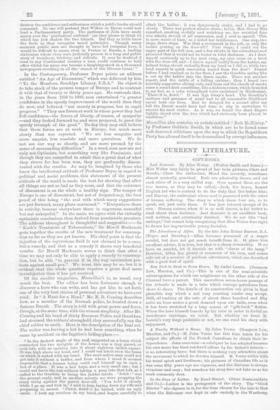In the Days of Luther. By Mime Stuart. (Swan Sonnenschein
and Co.)—Luther is the protagonist of the story. The "Good Elector" also figures in it, for the time chosen for the tale is that when the Reformer was kept in safe custody in the Wartburg.
There is an underplot of private interest. Altogether, the book will be found to have attractions for many readers. It is a sign of the times that it is printed, and apparently well printed, in Germany.—Another historical tale, and dealing with a kindred subject, is The Blacksmith of Boniface Lane, by "A. L. 0. E." (Nelson and Sons). Here the time is the reign of Henry IV. of England, and the hero of the story, one of the victims of the per- secution which then became, for the first time in England, systematic. One or two details strike us as decidedly incongruous. "We cannot think that such an inscription as " Bootmaker to the Prince of Wales" could have been seen over a fifteenth-century shop. Who is the " Bishop of Arundel " ? Presumably the author means Archbishop Arundel. —The Duke's Page. From the German, by Sarah M. S. Clarke. (Nisbet and Co.)—This is another story of the days of Luther, the narrative being taken up at a somewhat later period. A very good story it is. The German author, whose name we should have been glad to know, knows his subject well. It is clear that he is familiar both with the history and the social life of the period. At the same time, he does not overload his pages with details. The " page " is Wolf, son of Eguihard of Neuenburg ; the " duko " is Maurice, Duke, and afterwards Elector of Saxony. Our author takes us through the entangled story of the Smalkald League, and of the Elector Maurice's relations to the Protestant Princes and to the Emperor. Maurico's is a character hard to understand. Whether the conception that is hero given of him is right or wrong, it is, anyhow, distinct and consistent. Not many books of this season are of such sterling value as The Duke's Page. —A story with a kindred subject, though the scene is hose laid in Prance, is La Rochelle ; or, the Refugees : a Story of the Huguenots, by E. C. Wilson (T. Nelson and Sons). The time is that which followed the Edict of Nantes.
We have received from Messrs. Marcus Ward and Co. three illustrated volumes, all good in their way. These are :—The Court- ship and Marriage of Cock Robin and Jenny Wren, full of very graceful little pictures by Miss Jessie Watkins. The actors in the little drama are boys and girls, figures prettily drawn and deli- cately coloured.—Monsieur Povf, by E. L. Streets, is tho history, told by pen and pencil, of a poodle dog. The dog, we may venture to say, is somewhat too slim ; the children are bettor—Piggy Wiggy, illustrated by %I. Caldwell, contains stories illustrating some well-known nursery-rhymes.















































 Previous page
Previous page